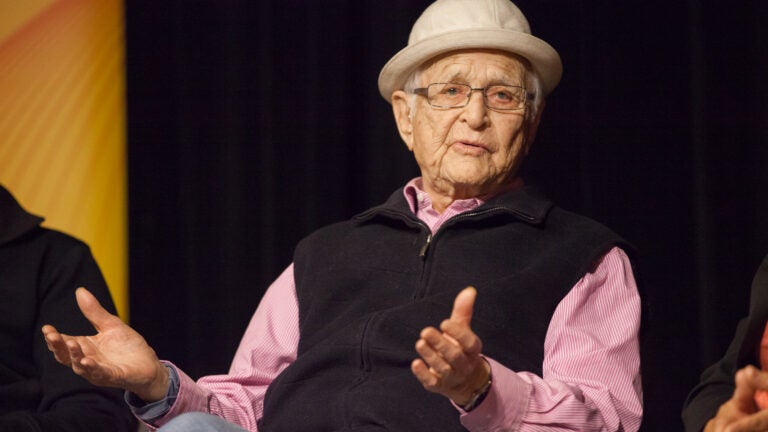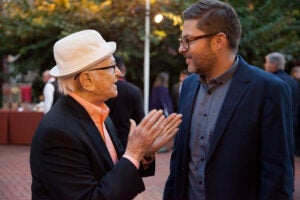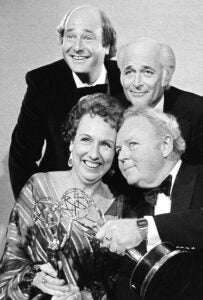
Norman Lear, here speaking at a USC Annenberg panel discussion in 2017, wrote and produced groundbreaking shows that revolutionized American television. (Photo/Brett Van Ort)
In memoriam: Norman Lear, groundbreaking TV producer and USC benefactor
A gift from Lear and his wife established USC Annenberg’s Norman Lear Center, which explores the impact of entertainment on society.
Legendary television writer and producer, businessman and philanthropist Norman M. Lear died Tuesday in Los Angeles. He was 101.
Perhaps best known for creating the character of Archie Bunker, the endearing bigot from 1970s sitcom All in the Family, Lear wrote and produced groundbreaking shows that revolutionized American television. A fierce advocate for American democracy, Lear was also recognized for his political activism. He created a nonprofit to protect constitutional rights and freedoms and launched a nonpartisan youth voter initiative.
Serving on the Board of Councilors at the USC Annenberg School for Communication and Journalism since 1998, Lear and his wife, Lyn Davis Lear, made a $5 million gift in 2000 to establish USC Annenberg’s Norman Lear Center, which explores the impact of entertainment on society. They donated an additional $6 million in 2007 to create the Norman Lear Chair in Entertainment, Media and Society at USC Annenberg. USC awarded Lear an honorary doctorate in 2008.

“So many of the themes Norman tackled through his groundbreaking work in television, like racism, sexism and democracy, helped shape our understanding of American society. He leaves a unique and lasting imprint on our cultural landscape,” USC President Carol Folt said.
“Norman was also a treasured member of the Trojan Family. Our students, to whom he made himself available regularly, benefited tremendously from his insights, experience and ideas. I know everyone at USC who had the opportunity to work with him will miss him dearly.”
“Norman was a towering figure in American entertainment, education and culture,” said USC Annenberg Dean Willow Bay. “For him, laughter and learning went hand in hand, illuminating our understanding and reinforcing our connection to one another. We were incredibly fortunate that Norman brought his intellect and empathy to USC Annenberg, supporting scholars and students to use communication in service of a better world. It’s a profound measure of his humanity that even as he leaves us at 101, we still feel it’s too soon.”
Remembering Norman Lear
- Read tributes honoring Lear from USC Annenberg Professors Oscar Garza, Martin Kaplan and Robert Scheer.
Lear’s television shows didn’t shy away from controversial topics, instead using humor to spark a public discourse about race, religion, violence and other uncomfortable issues. His willingness to tackle the nation’s societal ills prompted President Bill Clinton, when honoring Lear with the National Medal of Arts in 1999, to proclaim, “Norman Lear has held up a mirror to American society and changed the way we look at it.”
Born in 1922, Lear grew up in a Jewish family in Connecticut. His father, who worked in sales, received a three-year prison sentence for fraud when Lear was 9 years old. Lear was sent to live with his aunt and uncle, then his grandparents, experiences that shaped his determined and resilient nature.
“Nobody quite understood what the hell I was going through, and I had to make my own way,” he said in an interview with NPR in 2016. “There wasn’t anybody going to help me.”
Lear graduated from Weaver High School in Hartford and attended Emerson College in Boston before dropping out to join the U.S. Air Force. He flew 52 combat missions during World War II as a radio operator and gunner, ultimately earning the Air Medal before leaving the military in 1945.
Norman Lear moves to television
After four years in public relations, Lear pursued comedy writing and began his television career in 1950, collaborating with Ed Simmons to write for the Ford Star Revue. Jerry Lewis hired the duo away only four shows later to work on the Colgate Comedy Hour. Lear bounced from show to show as a writer during the 1950s before joining director Bud Yorkin to create Tandem Productions in 1958. Embracing multiple roles as executive producer, writer and director, Lear helped create television series and several feature films; he received an Oscar nomination in 1967 for his script for Divorce American Style.

In 1970, Lear signed on with CBS to revamp a British sitcom that his partner Bud Yorkin discovered while in England, Till Death Us Do Part, for an American audience. First airing in January 1971, All in the Family became a breakout hit, earning several Emmy Awards during its run as well as the Peabody Award in 1977. The show explored social issues such as inequality, sexuality and racism, using comedy to soften taboo topics while embracing off-color jokes and profanity.
A steady stream of sitcom hits followed, from Maude and One Day at a Time to Mary Hartman, Mary Hartman. Lear also gained acclaim for placing Black characters and families in starring roles, such as in Sanford and Son, Good Times and The Jeffersons.
In 1975, Lear received a star on the Hollywood Walk of Fame. In 1984, he became one of the seven inaugural honorees inducted into the Television Academy Hall of Fame.
His companies, Tandem Productions and T.A.T. Communications Co., merged in 1982 to become Embassy Communications, which Lear sold three years later. He then founded and served as chairman and CEO of Act III Communications, a multimedia company with holdings in television, film and licensing.
By the early 1980s, Lear was itching to become more involved in political activism, having grown concerned about increasing social tension and polarization. He shifted his focus away from television to found People for the American Way, a nonprofit organization with a mission to combat right-wing extremism and protect constitutional values such as free speech and religious freedom, equal protection under the law, and the right to meaningfully participate in democracy.
Lear founded other nonprofits, including the Business Enterprise Trust to highlight social innovations among American businesses. Norman and Lyn Davis Lear also founded the Environmental Media Association to encourage environmental responsibility in the entertainment industry.
In 2000, he established the Norman Lear Center at USC. Its research, publications, events and advocacy explore topics such as the public interest obligations of broadcasters; the influence of technology and intellectual property law on creativity in music, film and fashion; the globalization of entertainment; and the use of entertainment to promote civic engagement among young people.
“The Lear Center’s quarter-century of informing and inspiring Hollywood’s creative community to use its power for social good, and our decades of academic research on the content and social impact of media and entertainment, are a tribute to Norman’s belief that stories matter and that we matter,” said Martin Kaplan, the center’s founding director and inaugural holder of the Norman Lear Chair in Entertainment, Media and Society.
University Professor Geoffrey Cowan added that Lear’s achievements went far beyond his work as a writer and producer.
“Even in his last years of life, at the age of 100, Norman joined my classes as a guest where he was an inspiration,” Cowan said. “Students shared their own stories, describing how he and his shows had changed the lives of their families long before they were born.”
Norman Lear and the Declaration of Independence
In 2001, Norman and Lyn Davis Lear purchased one of the few surviving original copies of the Declaration of Independence. During a self-proclaimed Declaration of Independence Road Trip, they traveled the country, touring all 50 states, to inspire civic activism and launch Declare Yourself, an initiative that encouraged more than 4 million young people to register to vote in the 2004, 2006 and 2008 elections.
Lear released his candid and critically acclaimed memoir, Even This I Get to Experience, in 2014. Two years later, a documentary titled Norman Lear: Just Another Version of You, based on his memoir, premiered at the Sundance Film Festival.
A testament to the enduring quality of his storytelling, a reboot of One Day at a Time, starring Justina Machado and Rita Moreno as members of a Cuban American family, was launched by Netflix in 2017 with Lear serving as executive producer. That same year, Lear was a recipient of the Kennedy Center Honors.
Producing and hosting three episodes of ABC’s Live in Front of a Studio Audience, which used current stars to re-create original episodes of The Jeffersons, All in the Family and Good Times, Lear won Primetime Emmy Awards in 2019 and 2020.
Reflecting on the successes and failures of his life and career in a 2017 article in GQ, Lear, then 94, acknowledged that “being a human being is hard work. For me, laughing has been what adds the years.”
Lear is survived by his wife; children Kate, Maggie, Ellen, Benjamin, Brianna and Madeline; and four grandchildren.
Eric Lindberg and Emily Cavalcanti contributed to this report.



